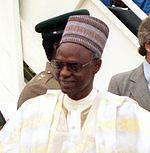Shehu Shagari
Shehu Shagari was born in Shagari, Sokoto State, Nigeria on February 25th, 1925 and is the World Leader. At the age of 93, Shehu Shagari biography, profession, age, height, weight, eye color, hair color, build, measurements, education, career, dating/affair, family, news updates, and networth are available.
At 93 years old, Shehu Shagari physical status not available right now. We will update Shehu Shagari's height, weight, eye color, hair color, build, and measurements.
Shehu Usman Shagari entered politics in 1951 when he became the secretary of the Northern People's Congress in Sokoto, Nigeria, a position he held until 1956. However, his early Political activities started in 1945 when as a teacher, he founded a youth group called Youth Social Circle in Sokoto and became the secretary. The organization became one of the smaller groups that came together to be part of Northern People's Congress (NPC) which was founded in 1948.
In 1948, when Dr. Nnamdi Azikiwe of the NCNC was touring Nigeria to raise funds to send a delegation to London to ask the Colonial office to abrogate Richard's constitution as undemocratic, Shehu Shagari who was a keen reader of the West-African Pilot paper was the only man of Sokoto origin to attend this meeting. When the British Provincial Educational Officer was informed of Shagari's attendance, his salary increment was postponed that year to serve as a punishment.
The West-African Pilot was banned in the northern region schools and Shagari wrote for it an article for its revival in 1948. At the same time, Shagari had started advocating for the departure of colonial rule that he had produced a Hausa pamphlet carrying poetry which he named "Anti Colonialist" and put it in circulation. In 1950, Shagari, a young teacher at 25, was nominated by a British District officer H.A.S Johnson to participate in the Ibadan Conference to debate the Richards Constitution.
In 1954, Shehu Shagari was elected into his first public office as a member of the federal House of Representative for Sokoto west. In 1958, Shagari was appointed as parliamentary secretary (he left the post in 1959) to the Nigerian Prime Minister, Sir Abubakar Tafawa Balewa and that year he also served as the Federal Minister for Commerce and Industries.
From 1959 to 1960, Shagari was the pioneer Federal Minister for Economic Development of independent Nigeria where his Ministry was responsible for drawing the 1962–1968 development plan. Shagari's Ministry of Economic Development was also responsible for the establishment of the Niger-Delta Development Board. From 1960 to 1962, he was the Federal Minister for Pensions which undertook the mission of Nigerianization of the civil service. From 1962 to 1965, Shagari was made the Federal Minister for Internal Affairs. From 1965 up until the first military coup in January 1966, Shagari was the Federal Minister for Works and had executed many important projects including Eko Bridge Lagos which was the first major contract of the German construction firm Julius Berger in Nigeria, and the completion of the Niger Bridge which was commissioned in 1966 by Prime Minister, Sir Abubakar Tafawa Balewa. In 1967 he was appointed as the secretary for Sokoto Province Education Development Fund. From 1968 to 1969, Shagari was given a state position in the North-Western State as Commissioner for Establishments.
As a Member of the Parliament and a Federal Minister, Shagari led and was part of several Nigerian missions abroad. As Minister of Economic Development, he was a member of the Nigerian delegation to the Tangiers Conference of the U.N. Economic Commission for Africa (ECA) which was led by Minister of Finance Chief Festus Okotie Eboh. In 1961, he led the delegation to the tenth anniversary of Libya's Independence. The same year, he was at the GATT Ministerial conference in Geneva, where he raised the issue of European Economic Community's (ECC) discrimination against African countries like Nigeria who were not then, associated with EEC. The same year, he led a delegation to the Commonwealth Parliamentary Conference (CPA) in London. He became the chairman of the next CPA Conference held in Lagos between October–November 1962.
In 1962, he led the delegation to ECA meeting in Addis Ababa to the commission's third meeting, the first which Nigeria attended as a full member where he strongly urged for price stabilization arrangement for tropical products. In 1963, Shagari was Nigeria's delegate to CPA meeting in Kuala Lumpur. Then in December 1965, just when Ian Smith made the Unilateral Declaration of Independence, Shehu Shagari attended the CPA conference in Wellington, New Zealand where he criticized and made an explicit denunciation of Ian Smith's declaration. In the same meeting. Shagari also expressed concerns about Rhodesia now Zimbabwe where he criticizes the Britain colonial policies the handling of Rhodesia's situation. Shehu Shagari's speech at the CPA conference was so significant and far-reaching that he had received many commendations from other delegates. He also made headlines on New Zealand's Christchurch Star of 4 December 1965, and The Morning Post of Wellington.
He also led a delegation to the first session of the Economic Social Commission of the Organisation of African Unity (OAU). Shagari also represented the Prime Minister on different occasions including when President Gamal Abdel Nasser of Egypt invited the Nigerian Prime Minister Abubakar to inspect Egypt's security arrangements. He also represented the Prime Minister Tafawa Balewa at Winston Churchill's funeral.

